|
P
E S C E T A R I A N I S M
ABOUT -
CONTACTS - DONATE
- FOUNDATION -
HOME - A-Z INDEX
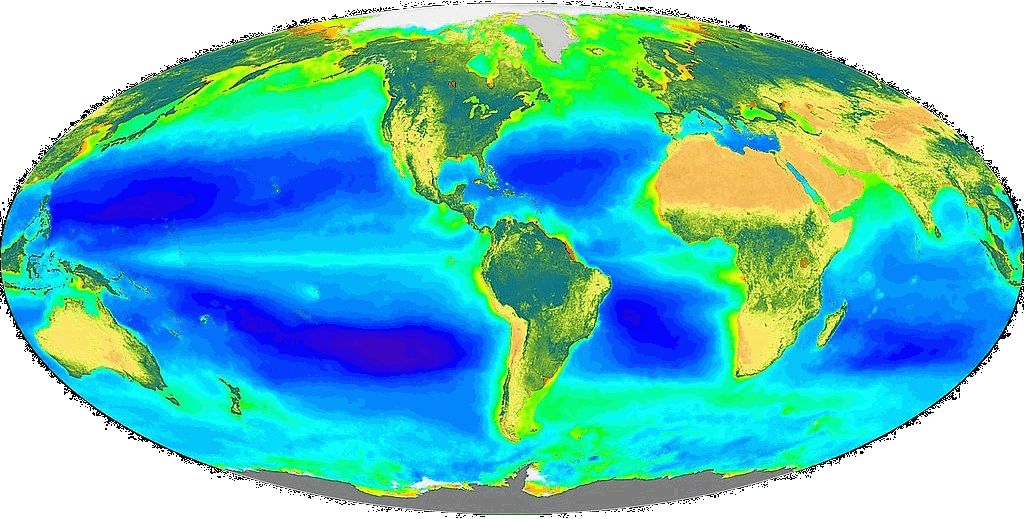

INCOMING
FOOD ENERGY - The average rate of energy capture by photosynthesis globally is approximately 130 terawatts, which is about three times the current power consumption of human civilization. Plants usually convert light into chemical energy with a photosynthetic efficiency of 3–6%. It is estimated that between 50% and 85% of the world's
oxygen is produced via
phytoplankton photosynthesis.
Photosynthetic organisms also convert around 100–115 thousand million metric tonnes of carbon into biomass per year.
All life on earth begins with the conversion of sunlight into
chemical energy as carbohydrates, such as sugars. This process
is called photosynthesis. Photosynthesis is the first stage of
any food chain be it on land or in the sea.
At
every successive stage of any food chain potential energy for
life is lost as one animal absorbs another. By the time
animal protein reaches our tables as meat or fish the
theoretical 130 terawatts (trillion watts) we started with for
all life on earth is significantly reduced. Like
it or not we are all part of a food chain. Our food footprint
is lowered by eating food that originates further down the
food chain. It is argued that pescetarians eat more sustainably than
habitual omnivores, as do vegans
and vegetarians. 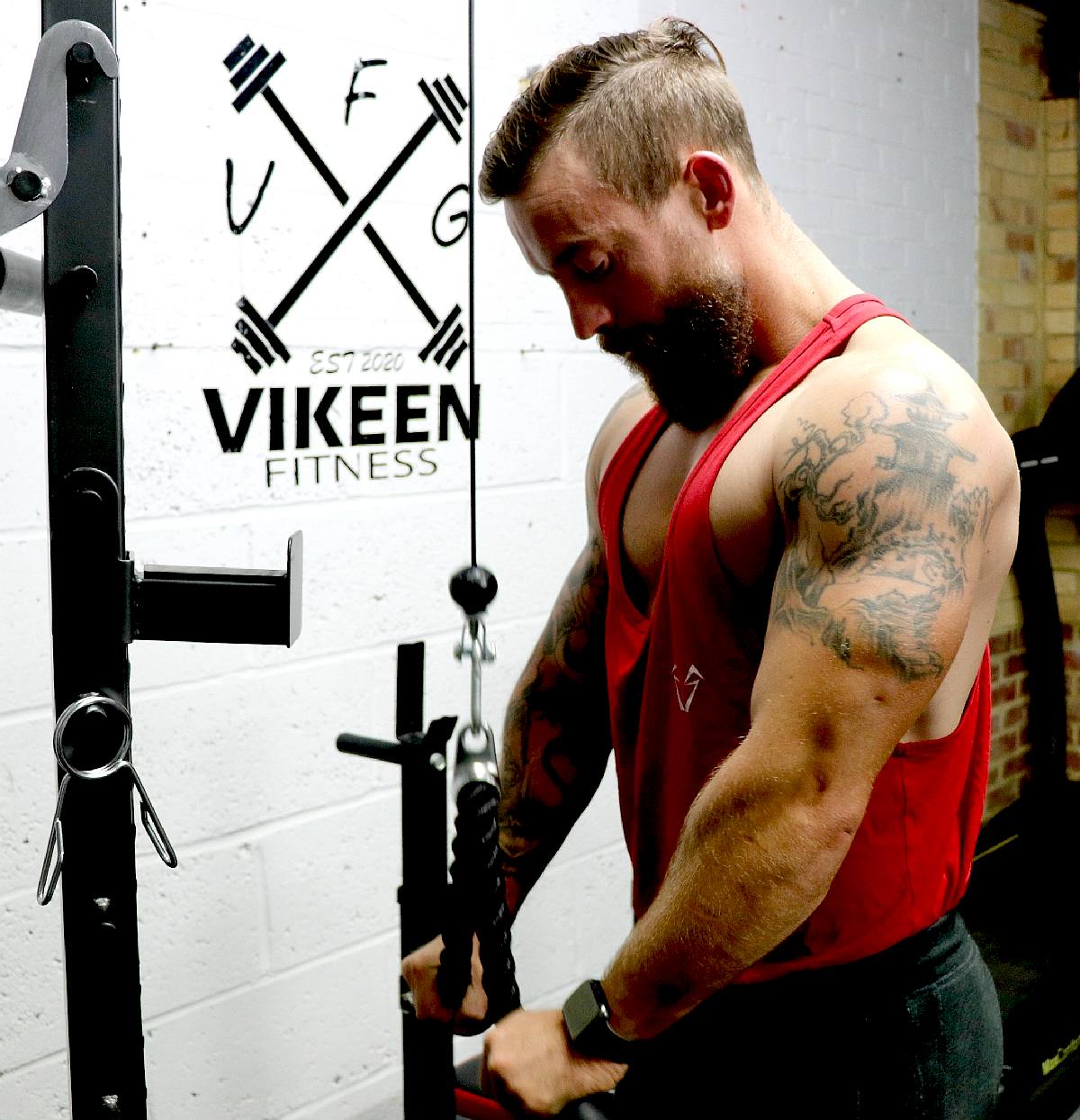
VEGAN
DIET - Terry is a vegan, looking pretty fit and loaded
with muscle, from his healthy diet. He is the founder of
Vikeen fitness, based in Eastbourne, Sussex, UK. And a
personal trainer, online
and in the gym.
PESCETARIANISM Pescetarianism (also spelled pescatarianism) is the practice of following a diet that includes fish or other seafood, but not the flesh of other animals.
Those on pescetarian or pollotarian diets may define meat only as mammalian flesh and may identify with vegetarianism. Most pescetarians maintain a lacto-ovo vegetarian diet with the addition of fish and shellfish, described as "fish but no other meat". The common use association between such diets and vegetarianism has led groups such as the
Vegetarian Society to state that diets containing these foods are not vegetarian.
Pescetarians are sometimes described as vegetarian or pesco-vegetarian, but vegetarians commonly do not consider the pescetarian diet to be vegetarian. The Vegetarian Society – whose members historically did not object to the consumption of "eggs, milk or fish" – now does not consider pescetarianism to be a vegetarian diet. Despite this, definitions of vegetarian in mainstream dictionaries sometimes include fish in the diet. The Pescetarian Society evolved separately from The Vegetarian Society to better represent the lifestyle and interests of pescetarians.
HEALTH
One commonly cited reason for converting to pescetarianism is that of health, based on findings that red meat is detrimental to health in many cases due to non-lean red meats containing high amounts of saturated fats, choline and carnitine. Eating certain kinds of fish raises HDL levels, and some fish are a convenient source of omega-3 fatty acids, and have numerous health benefits in one food variety.
A 1999 meta-analysis of five studies comparing vegetarian and non-vegetarian mortality rates in Western countries found that in comparison with regular meat-eaters, mortality from ischemic heart disease was 34% lower in pescetarians, 34% lower in ovo-lacto vegetarians, 26% lower in vegans and 20% lower in occasional meat-eaters.
Concerns have been raised about consuming some fish varieties containing toxins such as mercury and
PCBs, though it is possible to select fish that contain little or no mercury and moderate the consumption of mercury-containing fish, the increasing toxicity as a result of
plastic in our oceans is quite
alarming. In health terms
alone it pays to think about ways of reducing your food
footprint.
MAKE
SURE YOU TAKE YOUR VITAMINS VITAMIN
A
VITAMINS
B 1, 2, 3, 5, 6, 12
VITAMIN
C
VITAMIN
D
VITAMIN
E
VITAMIN
K2
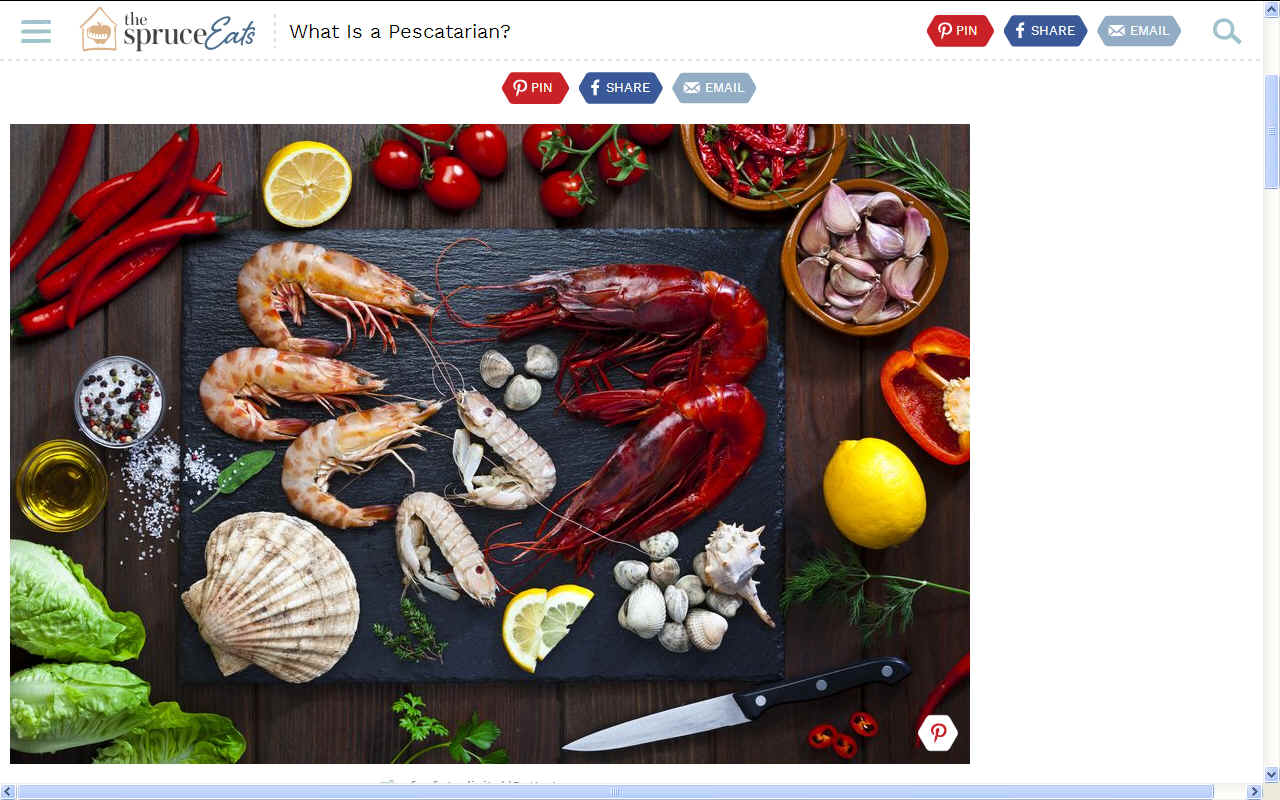
FOOD CHAINS
Some pescetarians adopt their diet because of the inefficiency of other meat sources. For example, in the
United States most cattle, chickens and pork are not free-range and are fed with grains specifically
grown for their food. Therefore, the environmental impact and the amount of energy needed to feed a cow, a chicken or a pig greatly exceeds its nutritional value. Such pescetarians might prefer to eat wild-caught fish, as opposed to farmed carnivorous fish that require food input of other fish. They might use guides such as the
'Seafood Watch' to determine the sustainability of their seafood source.
Other pescetarians might regard their diet as a transition to vegetarianism, an ethical compromise (ethical
pescetarianism), or a practical necessity to obtain nutrients absent or not easily found in plants.
Furthermore, pescetarianism may be perceived as more ethical because fish, along with certain other animals such as insects, may not associate pain and fear as more complex animals like mammals do. Researchers have found that, unlike mammals, fish do not have the neuro-physiological capacity for a conscious awareness of pain. Fish do not possess a neocortex, which is the first indicator of doubt regarding whether they have pain-awareness. That is, certain nerve fibres in mammals (known as c-nociceptors) involved in the sensation of intense experiences of pain are not present in primitive cartilaginous fish.
Some cartilagenous fish, such as
sharks and rays do contain traces, yet there is an incomplete development of these fibres. To further test this, researchers administered powerful painkillers (such as morphine, which are highly effective in humans and mammals) to fish. They were found to be either totally ineffective or were only partially effective in doses so high that would result in death from overdose. In this respect, although fish do show instinctive reactions to injuries and other interventions, the physiological prerequisites for the conscious experience of pain is not present. This, in combination with the pharmacological data, has supported the notion that fish do not feel pain in human, mammalian or biological terms. However,
bear in mind that this theory is disputed.

PESCATARIAN
DIET - It is possible to live a long and healthy life
eating fruits, nuts and grain with fish included to increase
protein intake and variety. In our modern world with
processing, we may even enjoy fish like products that are
derived from vegetable proteins such as crab sticks.
HUFFINGTON
POST NOVEMBER 2011 - 5 REASONS TO BECOME A PESCETARIAN Becoming a pescetarian was one of the most important and life-changing decisions that I've ever made - and I made it at age 14. I have not eaten meat since then except for fish, and I don't plan to for the rest of my life.
You may be wondering, "What is a pescetarian?" Pescetarianism, or pesco-vegetarianism, means being vegetarian while still including seafood in your diet. One still cuts out red meat, pork, poultry, etc. from his or her diet like a vegetarian, but does not cut out fish and other seafood.
One of the biggest meat-lovers I ever met, my loving boyfriend Mick Merivel, has even adopted the pescetarian diet. He has been a pescetarian now for the past three months and has been pleasantly surprised at how easy it is
- even though he had been eating meat regularly for the past 30 years. He says, "The switch to a pescetarianism diet was not hard for me at all, because the ability to continue to eat fish and seafood eliminated my desire for meat."
Many people ask me "How did you do that? I could never give up meat!" What a lot of people don't realize is that over time your body's unnatural craving for mammal and poultry meat disappears, and a healthy body will get sick from beef, pork or chicken if eaten again after a period of a pescetarian diet. This is because land-animal flesh is filled with toxins, uric acid and fecal bacteria.
And frankly, I believe that the human body should always reject these meats, but we are feeding it to our toddlers and convincing them
- as we have been convinced - that it is natural and normal. But consider this, do natural carnivores have to cook their meat in order to not get sick and season it so it can taste good to them? Would a human baby kill and eat raw a live chicken out of instinct as for example a baby lion would? No.
Here's another thing to think about - can we eat raw fish and seafood if it's healthy and clean and not get sick? Yes. Do we always have to season fish and seafood for it to taste good? No. Are there the same health risks from eating healthy, fresh fish as there are from eating land animals? No.
The only reason the human race started to eat land animals was back when cavemen had to survive in the wild, and berries and vegetables were scarce and killing mammals was their only way to survive. I would say we have definitely advanced since then - everyone could survive on a vegan diet if they chose. That's all it is. It is making a decision to not only improve your health and extend your life, but contribute to saving our planet and natural resources
- and our animals - who deserve to live a free and happy life as much as we do.
So I put together a list of the top five reasons why I believe you should go pescetarian. All I ask of you today is to try the 30 Day Challenge. All you do is take a pledge to cut out meat, excluding fish and seafood, from your diet for the next 30 days. With the increase of fresh fish and vegetables in your diet, I believe that you'll feel healthier, experience less headaches and sickness as well as increased energy levels. In the long-term, you may also improve
your
weight, the health of your brain and
heart, hair and even your
skin.
According to The New York
Times, meat consumption in the United States has doubled in the last 50 years. And since then, haven't other problems increased? Cancer, heart disease, stroke, obesity: these have all increased drastically over the past 50 years. Any connection? These trends may go hand in hand.
1) Pescetarianism may drastically improve your health.
A pescetarian diet may not only reduce your risk for heart disease and other cardiovascular diseases, but stroke, osteoporosis, obesity, diabetes, arthritis, high blood pressure and some types of cancer. According to the Yale College Vegetarian Society, experts say that up to 80 percent of
cancer cases are preventable through healthy diets that contain low amounts of fats and oils, and high amounts of fiber - the model pescetarian diet.
Meat is often covered in pesticides and chemicals that are harmful, and after extended consumption, can be very dangerous, to humans. Every bite of a beef/pork hotdog contains seven cancer-causing pesticides. And here's a shocking fact, brought to light by David Steinman's
"Living Healthy in a Toxic
World": The primary source of nuclear radiation contamination in humans is from beef and dairy products.
Additionally, all of the iron you need comes from fish, many fruits and vegetables and whole grains. And all the protein you need comes from consuming a healthy percentage of legumes, whole grains, tofu, and many plant sources.
Vegetarian diets supply more than
adequate amounts of protein.
So now we know that we can get enough protein without eating any meat at all, where does including fish in our diets come in?
Fish is very low in saturated fat and contains very large quantities of polyunsaturated omega-3 fatty acids, which have been connected to possible treatments for an array of conditions including heart disease, depression and ADD.
Omega-3s have also been shown to have potential risk-reducing effects when it comes to
cancer,
cardiovascular disease and
diabetes. Another huge benefit of including fish in a vegetarian diet is the healthy amount of iron in fish and seafood. Pescetarians have a
lower risk of developing iron deficiency anemia
- a common condition among vegans and vegetarians. Eating fish also combats D-3 deficiency, which is a common condition among many Americans.
2) Becoming a pescetarian benefits our planet.
The Vegetarian Resource Group reports that one pound of beef requires 2,500 gallons of water, whereas one pound of soy requires only 250 gallons of
water and a pound of wheat requires only 25 gallons. If you want to help save our water, cutting meat from your diet one way that you get active.
Additionally, the deforestation caused by the need to create space to house livestock is tremendous. A Smithsonian Institution
study shows that the demand for more grazing land means that every day, a land area equivalent to seven
football fields is destroyed in the Amazon basin.
According to Earth
Talk, "The Environmental Beef With Meat," for every hamburger that came from an animal raised on rainforest land, approximately 55 square feet of forest was destroyed. And it's not just the rainforest being destroyed. In the United States, more than 260 million acres of forest have been clear-cut for animal agriculture as of 2005.
The livestock in the Unites States also creates an unimaginable amount of waste and toxic emission - as do the fertilizers used. Livestock
raised for slaughter produce 130 times the excrement of the entire human population.
But most shocking of all is that the grains and corn that are wastefully fed to the mass amounts of livestock in the United States, could be instead be fed to the
60 million human beings who die of starvation every year all over the world.
3) I believe you aren't against animal cruelty unless you are some type of vegetarian.
Most people know somewhat of what is going on in slaughterhouses and cow, pig, chicken and turkey farms. They know that animals are bred for murder in these places so they can be killed and eaten for the pleasure of humans. But what some people may not know are the disgusting conditions and inhumane treatment of these innocent animals behind their closed doors. Animals are subjected to some pretty terrible living conditions, full of feces and flies, packed into crates so crowded that they can hardly move. Their natural habits are taken from them.
Chickens for example are kept in big warehouses in tiny wire cages as big as file cabinets
- packed with about 10 or more chickens. The chickens peck at each other, so their beaks are removed to prevent them from doing this. This is called de-beaking. This is done to each chicken with no painkillers. Their breasts are so heavy from injected growth hormones that they sometimes can't even stand, and their legs are often already broken. Many cages house chickens that have already died from disease.
The treatment of hogs and cows are just as terrible, often still alive and struggling as they are hung upside down and taken down a belt to have their throats slit or beheaded by an automatic machine. Many times the animal is not dead immediately, because their throat had only been nicked as they get hacked into pieces or boiled alive. "If slaughterhouses had glass walls, everyone would be vegetarian."
- Paul McCartney 4) We aren't natural carnivores.
Natural carnivores have claws, pointed front teeth to tear raw flesh and no pores on the skin so they perspire through the tongue. Plant and fish eaters perspire through pores on the skin since they are searching for food during hot hours
- not hunting at sunrise, sunset or under cover of darkness as carnivores do. Carnivores also have a shorter intestinal tract than plant and fish eaters do so rapidly decaying carcasses in the stomach can pass out of the body quickly. Herbivores and omnivores have an intestinal tract that is several times their body length since a mostly plant-based diet doesn't include food that decays as quickly. The human
intestinal tract is about 25 feet long. Doesn't that tell you something?
Fish on the other hand are digested much, much quicker than red meat. The omega-3 fatty acids that are in fish and seafood are
necessary in the diet of a human being
- fish is the only true source of the omega-3 acids DHA and EPA. There is no supplement that needs to be taken when the flesh of land animals is cut out of the diet; it only improves your health to not eat this kind of meat.
I do acknowledge that it has been shown that fish farms can be inhumane - even though fish are much less sentient and self-aware than land animals. However I still recommend you avoid fish that come from fish farms, and try to consume only wild fish that has been caught fresh. This way you get omega-3 acids in their purest and healthiest form, and also reduce your risk of consuming sick fish that may be packed with chemicals from fish farms. It's also similar to choosing to eat only free-range eggs
- like the hens who lay the eggs that get to run around free of a cage, these fish come from the sea or rivers in their natural habitats.
5) Many successful individuals choose vegetarian or pescetarian diets.
These people eat fish but no other type of meat, for fish is needed in the diet, and they understand this. Many people however who are pescetarian still refer to their diet as vegetarianism. This is very common and is not wrong to say - pescetarian, also called pesco-vegetarian, is just a branch of vegetarianism. There are many types of vegetarians, and every one of them is making an effort to improve their health, contribute less to animal cruelty and help save our planet. Some types of vegetarians will accuse other types as being hypocrites, and attack their diet choices. For example, many vegans and vegetarians attack pescetarians, while they know that they themselves need to take fish oil capsules every day containing omega-3 acids to stay healthy, which they know only comes from fish. They ask, "How can you justify eating fish?" I ask, "How can you believe that it is not natural to eat something we as humans need to be healthy?"
I believe that whatever type of lifestyle one leads to benefit the planet, save the animals, or better one's health, they deserve only praise. Little steps are ok
- some take a leap in the beginning, others take steps gradually towards their goal. I believe that as long as we are aware and acting on our intentions, that's what matters. Nutritionist
Jean Mayer suggests that if we reduced our country's meat consumption by just 10 percent, we could feed another
60 million hungry
individuals. Now think about all the other good we could do for the planet by just that one act alone.
By Chloe Spencer 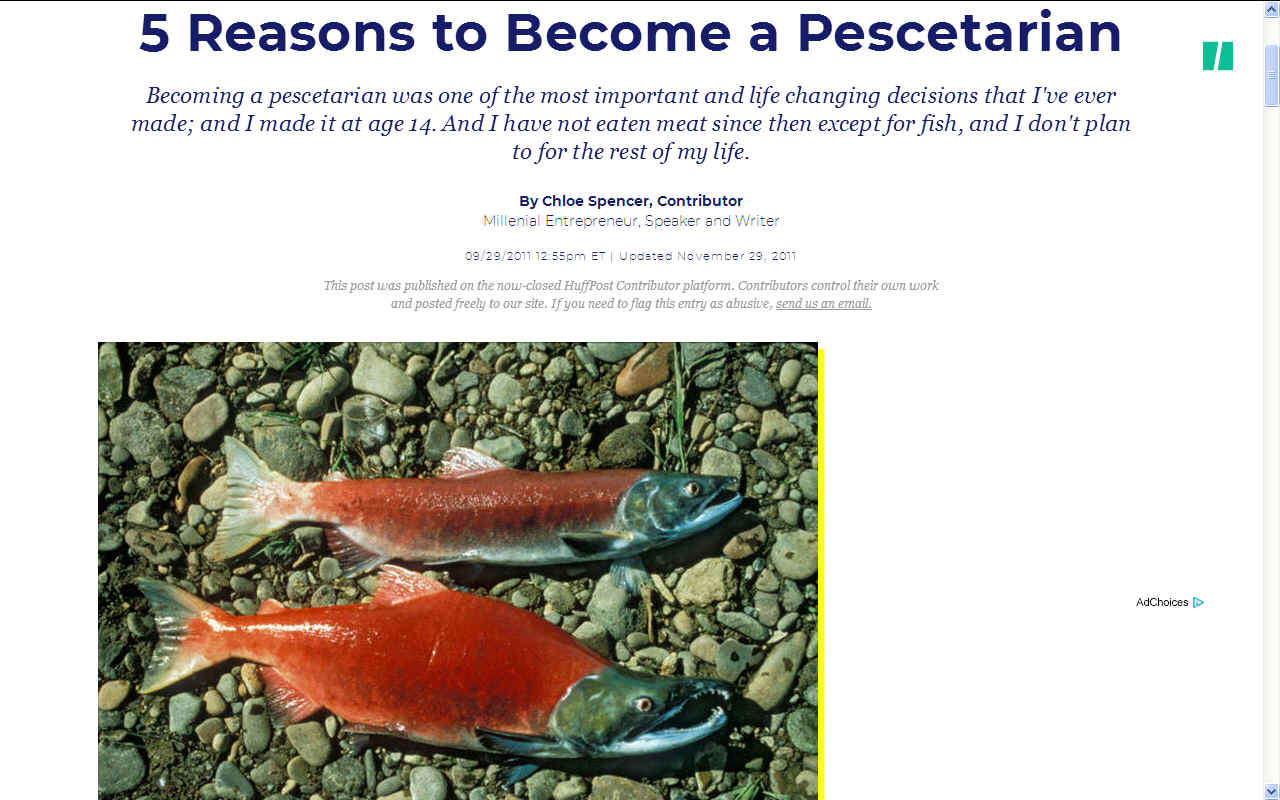
WHAT
IS A FOOD CHAIN ?
A food chain is a linear network of links in a food web starting from producer
or Primary organisms (such as grass or trees on land, and
phytoplankton in the sea, which use the radiation from the
sun to make their food) and ending at apex
or Predator species (like grizzly bears or
killer
whales), detritivores (like earthworms or woodlice), or decomposer species (such as fungi or
bacteria) that reduce Predator and Primary organisms to earth
to give us a (sustainable)
life cycle. A food chain also shows how the organisms are related with each other by the food they eat. Each level of a food chain represents a different trophic level. A food chain differs from a food web, because the complex network of different animals' feeding relations are aggregated and the chain only follows a direct, linear pathway of one animal at a time.
REDUCING
CONTAMINATION
If
producer organisms are able to ingest toxins or plastics or microplastics
laden with carcinogenic
toxins, when they are eaten by the next predator up the line,
those contaminants are stored in their bodies for the next
predator up the line, until finally the top of the food
consumption pyramid is poisoned by the accumulation.
Vegans and vegetarians are thus less likely to be contaminated
by accumulated toxins than omnivores. Being
at the top of the food chain and the major consumer of all
flora and fauna on the planet,
man is likely to
suffer the most from contamination of his primary food
sources. Ironically, man is the most dirty animal on the
planet, fouling his patch with chemicals and plastic
and dumping them in our rivers
and oceans where these pollutants enter the
food chain to come back and haunt the human race. Such
practices are not United
Nations sustainable and not compatible with a circular
economy.
LINKS
& REFERENCE
http://www.doh.wa.gov/ehp/oehas/fish/fishbenefits.htm
http://www.webmd.com/healthy-beauty/features/top-10-foods-for-healthy-hair
http://www.ascentahealth.com/health-science/science-articles/omega-3-fish-oil-and-skin-health
http://healthhubs.net/cancer/eating-fish-may-reduce-cancer-risk/
https://www.amazon.com/gp/product/0399522069/ref=dbs_a_def_rwt_bibl_vppi_i3
http://www.nlm.nih.gov/medlineplus/ency/article/002467.htm
http://www.lef.org/protocols/metabolic_health/hemochromatosis_01.htm
https://www.huffpost.com/entry/pescetarianism_b_956965
https://www.thespruceeats.com/what-is-a-pescatarian-3376817
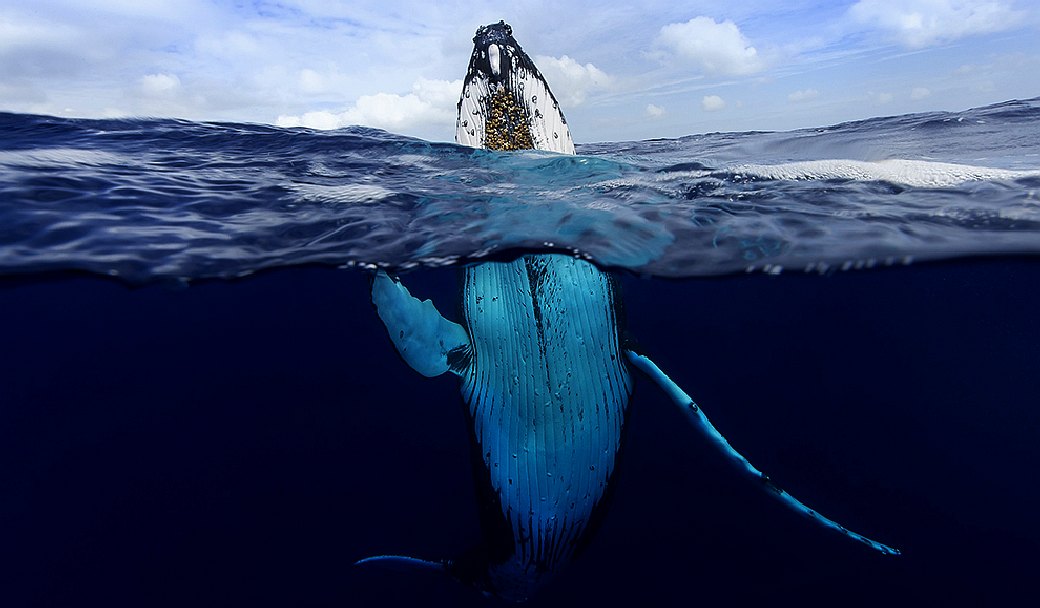
TOP
OF THE WORLD - Large filter feeders like this humpback
whale are at the top of their food chain and so entirely
reliant on the chain to be free of cancerous
toxins or plastic
for a healthy life. It's important to remember that when an organism eats it’s prey, it only gets a fraction of the energy that the prey has. This is why as we go up the food pyramid, the number of organisms decrease. This is because there isn’t enough energy to sustain too many lives.
Vegetarians are helping to keep animals that cannot change
eating habits alive and well.
BIOMAGNIFICATION
- BP DEEPWATER - CANCER
- DDT - FISHING
NETS - FUKUSHIMA - MICROBEADS
- MICRO
PLASTICS - OCEAN GYRES
- OCEAN WASTE -
PACKAGING - PCBS
- PET - PLASTIC
- POPS - SINGLE USE
This
website is provided on a free basis as a public information
service. Copyright © Cleaner
Oceans Foundation Ltd (COFL) (Company No: 4674774)
2022. Solar
Studios, BN271RF, United Kingdom.
COFL
is a charity without share capital.
|





